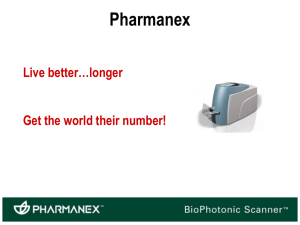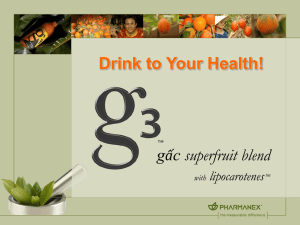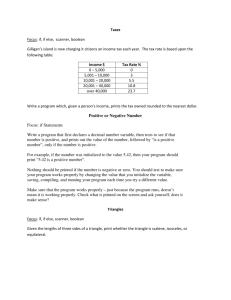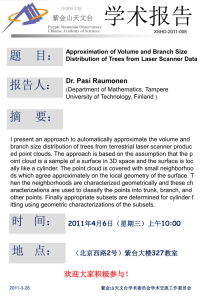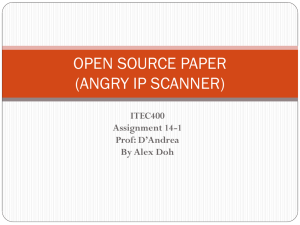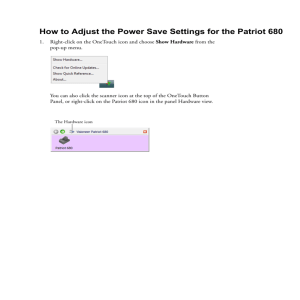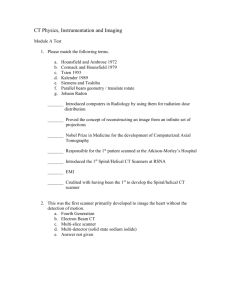Nu Skin
advertisement
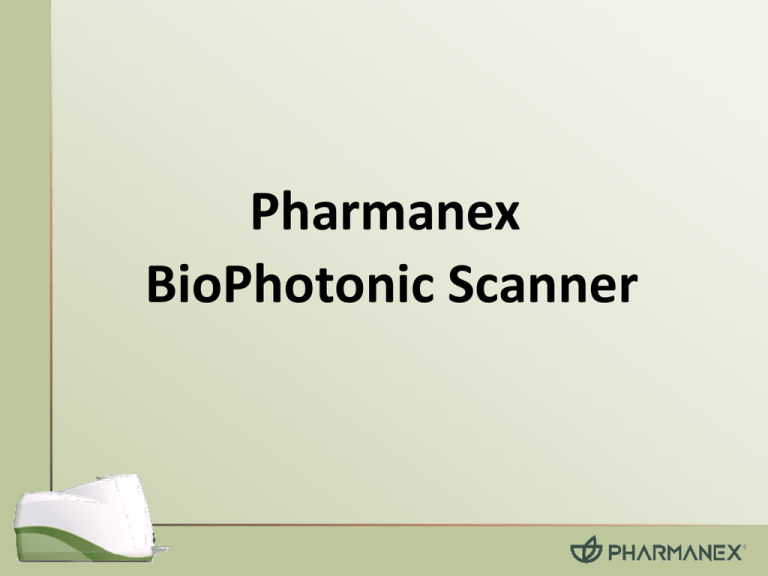
Pharmanex BioPhotonic Scanner What is the BioPhotonic Scanner? The Pharmanex BioPhotonic Scanner is a cutting- edge tool that measures your “Skin Carotenoid Score” (SCS). Research has shown a positive correlation between SCS and healthy lifestyle factors. Once you receive your SCS you can make improvements, and periodically track the effects of lifestyle changes such as increased fruit and vegetable consumption, weight management, smoking cessation, and nutritional supplementation including LifePak®Nano, and G3. The scanner is a powerful tool to help motivate people to maintain healthy lifestyle choices, and improve antioxidant nutrition. Free Radicals Each day we are exposed to free radicals—unstable molecules that steal or “scavenge” electrons from other molecules. Exposure to free radical activity is a natural part of life, but in today’s world it’s possible to become overexposed and experience greater consequences of free radical damage. Environmental pollution, unbalanced diets, preservatives and additives in food, physical and mental stress introduce free radicals to your body. When left unchecked, free radical damage to your cells accumulates and can lead to serious health concerns later in life. In fact, free radical damage can cause premature aging and is a large factor in the deterioration of health over time. Free Radical Damage A good example of free radical damage is an apple that has been exposed to the air. If you cover one half of the exposed apple with lemon juice (lemons contain the antioxidant vitamin C) it is protected from oxidative damage (a.k.a. free radical damage) and does not darken. The half that doesn’t have any protection turns brown, which indicates oxidation, or free radical damage— that ultimately causes the apple to decay. Just as free radicals are responsible for the decay of an apple, free radicals are also responsible for damage to tissues and cells in our bodies. Just as antioxidants are able to protect an apple from oxidation by free radicals, antioxidants can lend protection in our bodies. oxidation Antioxidants Block Free Radicals Antioxidants are abundant in fruits and vegetables. They are often responsible for the bright colors we see in produce, including reds, purples, yellows, and oranges. A healthy diet is imperative to delivering antioxidants to our tissues— however the eating habits of many people do not allow for adequate intake of antioxidants. Research suggests additional sources of antioxidants may provide added protection against increased free radical exposure. What Are Carotenoids? Carotenoids are an important category of antioxidants, they are primarily responsible for the reds, oranges, and yellows we see in fruits and vegetables. In our bodies noncarotenoid antioxidants rely on carotenoids to defend and replenish themselves, so that they can continue their cell-protective work. Research suggests that skin carotenoid levels measured with the Pharmanex BioPhotonic Scanner correlate with, and are a good indication of, the body’s overall antioxidant defense system. Raman Spectroscopy The technology of the Pharmanex BioPhotonic Scanner is based on an optical method known as Resonance Raman Spectroscopy, which has been used for many years in research laboratories. Only recently has Raman Spectroscopy been adapted to measurements in living tissue. Sir C. V. Raman, won the Nobel Prize in Physics in 1930 for his discovery of Raman Light Scattering. Check it out at nobelprize.org; search term: “Raman” When blue light (at exactly 473 nm) is shined onto carotenoids, the energy of the reflected light is ‘shifted’ to green (510 nm) due to a molecular characteristic shared among all carotenoids. This is known as ‘Raman shift’ Molecular length and an alternating single-double bond structure gives carotenoids the unique ability to shift blue light to green. Higher Frequency Lower Frequency UV IR 400 600 500 Wave Length (nm) Example shown: beta-carotene molecule 700 You Are What You Eat Or Rather: You Are What You Absorb Antioxidants from the foods you consume are incorporated into cells and tissues. The greater your consumption of antioxidant-containing fruits and vegetables, the higher the concentration found in your tissues. Beta-carotene* Lycopene* Lutein* The BioPhotonic Scanner measures the concentration of antioxidant carotenoids found in the tissues of your hand, as an indicator of antioxidant status. *There are over 500 carotenoids found throughout nature, these are just a few examples found in our diets Once the reflected light is collected from your hand by the BioPhotonic Scanner the data it transferred to the computer where it is converted into a Skin Carotenoid Score (SCS) which is represented by a number on a color scale of red (low) to high (blue) What Do Your Results Mean? Dietary habits, lifestyle, supplementation, and genetics can each affect scanner scores. The chart below provides general parameters* that are typically associated with low, mid-range, and high scores. Dietary Habits Supplementation Lifestyle Choices *Based on over 5 million scans. • Low consumption of fruits and vegetables • Irregular or no supplementation • High BMI (≥28) • High stress • High sun and pollution exposure • Smoker (including 2nd hand smoke) • Moderate consumption of fruits and vegetables • High consumption of fruits and vegetables • Regular supplementation • Optimal supplementation • Medium BMI (24- 27) • Moderate stress • Moderate sun and pollution exposure • BMI in the ideal range (19 – 23) • Low stress • Low sun and pollution exposure What Do Your Results Mean? Research has shown a positive correlation between SCS and healthy lifestyle factors such as: • High consumption of fruits & vegetables • Fit living— including exercise and appropriate body fat In other words, the more frequently you eat a healthy diet, and live an active lifestyle— the more likely your scanner score will be in the high range. *Scanner scores do not predict or diagnose disease. What Do Your Results Mean? Scanner scores have also been found to correlate inversely with negative lifestyle factors associated with increased exposure to free radicals. In other words, if you: • Smoke (including second-hand smoke) • Eat a poor diet • Have excess body fat —the more likely your scanner score will be in the low range. *Scanner scores do not predict or diagnose disease. Factors That Influence Your Score Your diet. Typically, people who eat high amounts of fruits and vegetables have higher scores. Your supplementation. Typically, people who consume well formulated antioxidant supplements have higher scores. Your body fat percentage. People who are overweight or have a high level of body fat for their height and gender often have a lower score. Your lifestyle. High levels of oxidative stress and exposure to free radicals can decrease your score. Tobacco smoke, stress, sunlight, pollution, and toxins are common sources of free radicals. Your genes. Individual differences in your body’s predetermined ability to absorb carotenoids will impact your SCS. How Can I Improve My Score? • Consume at least 5 to 10 servings of fruits and vegetables each day • Consume deeply colored fruits & vegetables with at least 5 grams of healthy fats per meal to aid in proper absorption of fat soluble nutrients • Take well formulated nutritional supplements (LifePak®Nano 2x/day) • Enjoy G3 Superfruit Blend daily • Quit smoking, avoid second-hand smoke, pollution & other toxins • Lose excess body fat • Limit sun exposure by using sun screen Scanner scores are reflective of long-term lifestyle habits, they are not subject to changes during short term intervals. Scanning every 6-8 weeks ideal. Scanning more frequently may not allow you to see the gradual, steady improvements. Skin Carotenoid Score Progress Report Too often people focus on the numeric score itself. It is far more important to focus on the choices that will improve your score, and then track the effect of those choices: Example Progress Report: Joe Customer Color Key: Access your personal SCS tracker at pharmanexusa.com Click <Scanner>; Scroll to <I’ve got my Number>; Click <Login to view score> n = 6,028,832 n = 1,191,145 Effect of Tobacco Use on Scanner Scores Non-tobacco users had scanner scores that were about 5,000 points higher on average than individuals who used tobacco. Based on the Pharmanex Scanner database which contains scans from over 5 million individual subjects as of May 2008 n = 980,685 n = 381,719 n = 398,947 n = 5,326,979 Effect of LifePak Use on Scanner Scores 2X daily LifePak users have scanner scores that are over 10,000 points higher on average than non-users, and almost 5,000 points higher on average than 1X daily LifePak users. Based on the Pharmanex Scanner database which contains scans from over 5 million individual subjects as of May 2008 n = 191,970 n = 572,074 n = 2,198,277 n = 2,276,345 Effect of Fruit & Vegetable Consumption As with LifePak, the benefits from F&V consumption are progressive. The more frequently you consume servings, the better your SCS becomes. Individuals that consume fewer than 2 daily servings of F&V had SCS that were about 5,600 points less than scores obtained by individuals that consumed 6 or more servings. Based on the Pharmanex Scanner database which contains scans from over 5 million individual subjects as of May 2008 n = 79,682 n = 232,283 n = 216,464 n= 3,146,613 Effect of MarineOmega Use Marine Omega use also appears to be a powerful influence on SCS Individuals who take MarineOmega 3 or more times a day have SCS’s that are on average about 8,400 points higher than individuals who do not take Marine Omega. Based on the Pharmanex Scanner database which contains scans from over 5 million individual subjects as of May 2008 n = 7,503 n = 21,195 n = 20,207 n = 760,358 Effect of G3 Use on Scanner Scores G3 Superfruit Blend use also has an effects Scanner Scores. Scanner database data shows the more servings you consume the better your SCS becomes. Based on the Pharmanex Scanner database which contains scans from over 5 million individual subjects as of May 2008 “We believe this Scanner will cause a paradigm shift in our understanding of antioxidants and health. The ability to track antioxidant activity will provide distributors with demonstrable proof of the health benefits of Pharmanex products.” Joseph Chang, Ph.D. Chief Scientific Officer and Executive Vice President, Nu Skin Enterprises

